Masters of Business and Project Management: Communication Skills
VerifiedAdded on 2023/06/09
|9
|2364
|192
Essay
AI Summary
This essay, prepared for a Master's program in Business and Project Management, comprehensively reviews the literature on the crucial role of communication skills for project managers. It emphasizes the need for project managers to possess strong communication abilities, including interactive, push, and pull communication, to foster effective teamwork, manage stakeholders, and ensure project success. The essay highlights how communication facilitates the exchange of information, addresses potential issues, and contributes to a positive working environment. It further discusses the components of professional communication, such as ideation, encoding, decoding, and feedback, and their impact on project outcomes. The essay concludes by underscoring the significance of communication in overcoming organizational challenges and advancing a project manager's career, while also suggesting the importance of personal and professional development to enhance overall competence. The essay integrates multiple sources to support its arguments and provide a detailed overview of the subject.
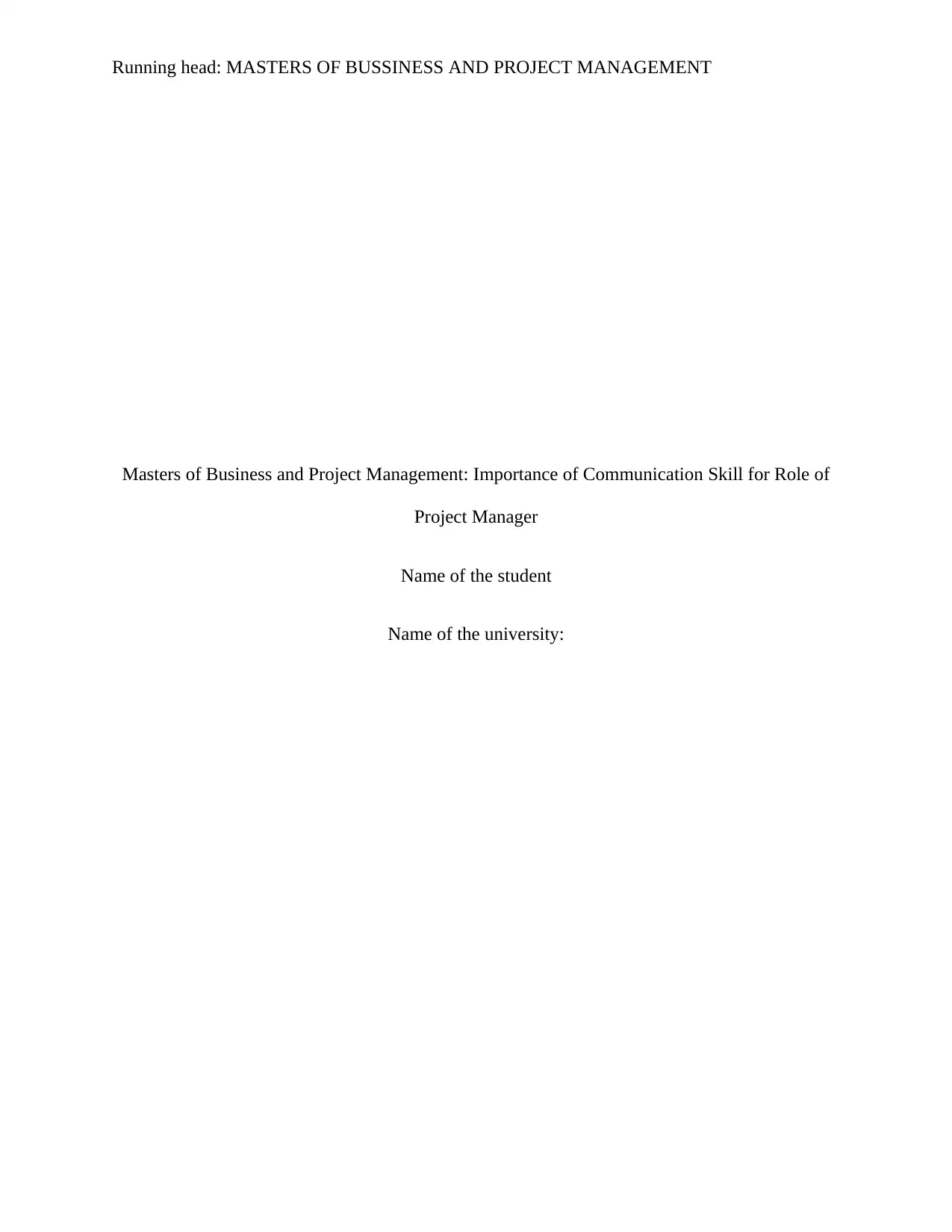
Running head: MASTERS OF BUSSINESS AND PROJECT MANAGEMENT
Masters of Business and Project Management: Importance of Communication Skill for Role of
Project Manager
Name of the student
Name of the university:
Masters of Business and Project Management: Importance of Communication Skill for Role of
Project Manager
Name of the student
Name of the university:
Paraphrase This Document
Need a fresh take? Get an instant paraphrase of this document with our AI Paraphraser
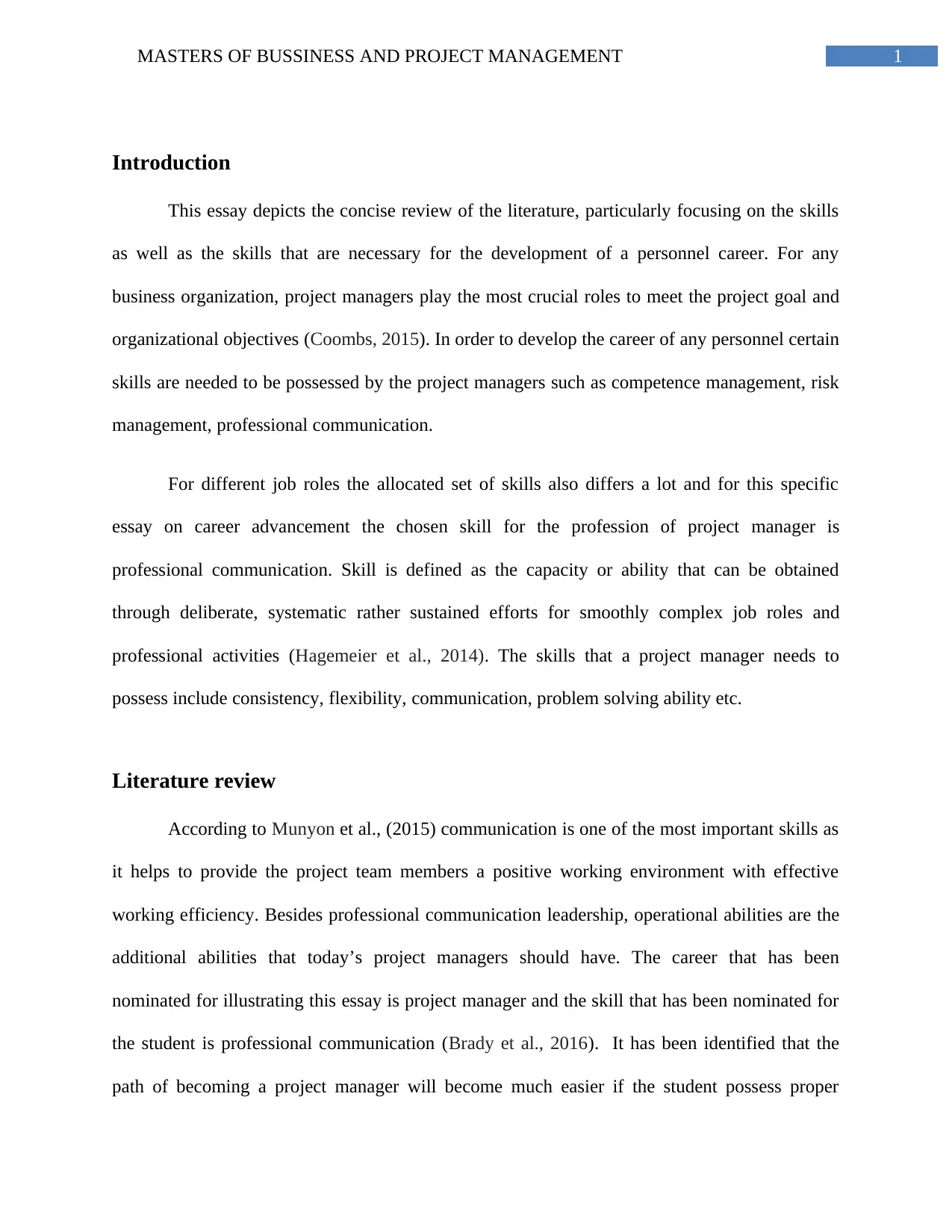
1MASTERS OF BUSSINESS AND PROJECT MANAGEMENT
Introduction
This essay depicts the concise review of the literature, particularly focusing on the skills
as well as the skills that are necessary for the development of a personnel career. For any
business organization, project managers play the most crucial roles to meet the project goal and
organizational objectives (Coombs, 2015). In order to develop the career of any personnel certain
skills are needed to be possessed by the project managers such as competence management, risk
management, professional communication.
For different job roles the allocated set of skills also differs a lot and for this specific
essay on career advancement the chosen skill for the profession of project manager is
professional communication. Skill is defined as the capacity or ability that can be obtained
through deliberate, systematic rather sustained efforts for smoothly complex job roles and
professional activities (Hagemeier et al., 2014). The skills that a project manager needs to
possess include consistency, flexibility, communication, problem solving ability etc.
Literature review
According to Munyon et al., (2015) communication is one of the most important skills as
it helps to provide the project team members a positive working environment with effective
working efficiency. Besides professional communication leadership, operational abilities are the
additional abilities that today’s project managers should have. The career that has been
nominated for illustrating this essay is project manager and the skill that has been nominated for
the student is professional communication (Brady et al., 2016). It has been identified that the
path of becoming a project manager will become much easier if the student possess proper
Introduction
This essay depicts the concise review of the literature, particularly focusing on the skills
as well as the skills that are necessary for the development of a personnel career. For any
business organization, project managers play the most crucial roles to meet the project goal and
organizational objectives (Coombs, 2015). In order to develop the career of any personnel certain
skills are needed to be possessed by the project managers such as competence management, risk
management, professional communication.
For different job roles the allocated set of skills also differs a lot and for this specific
essay on career advancement the chosen skill for the profession of project manager is
professional communication. Skill is defined as the capacity or ability that can be obtained
through deliberate, systematic rather sustained efforts for smoothly complex job roles and
professional activities (Hagemeier et al., 2014). The skills that a project manager needs to
possess include consistency, flexibility, communication, problem solving ability etc.
Literature review
According to Munyon et al., (2015) communication is one of the most important skills as
it helps to provide the project team members a positive working environment with effective
working efficiency. Besides professional communication leadership, operational abilities are the
additional abilities that today’s project managers should have. The career that has been
nominated for illustrating this essay is project manager and the skill that has been nominated for
the student is professional communication (Brady et al., 2016). It has been identified that the
path of becoming a project manager will become much easier if the student possess proper
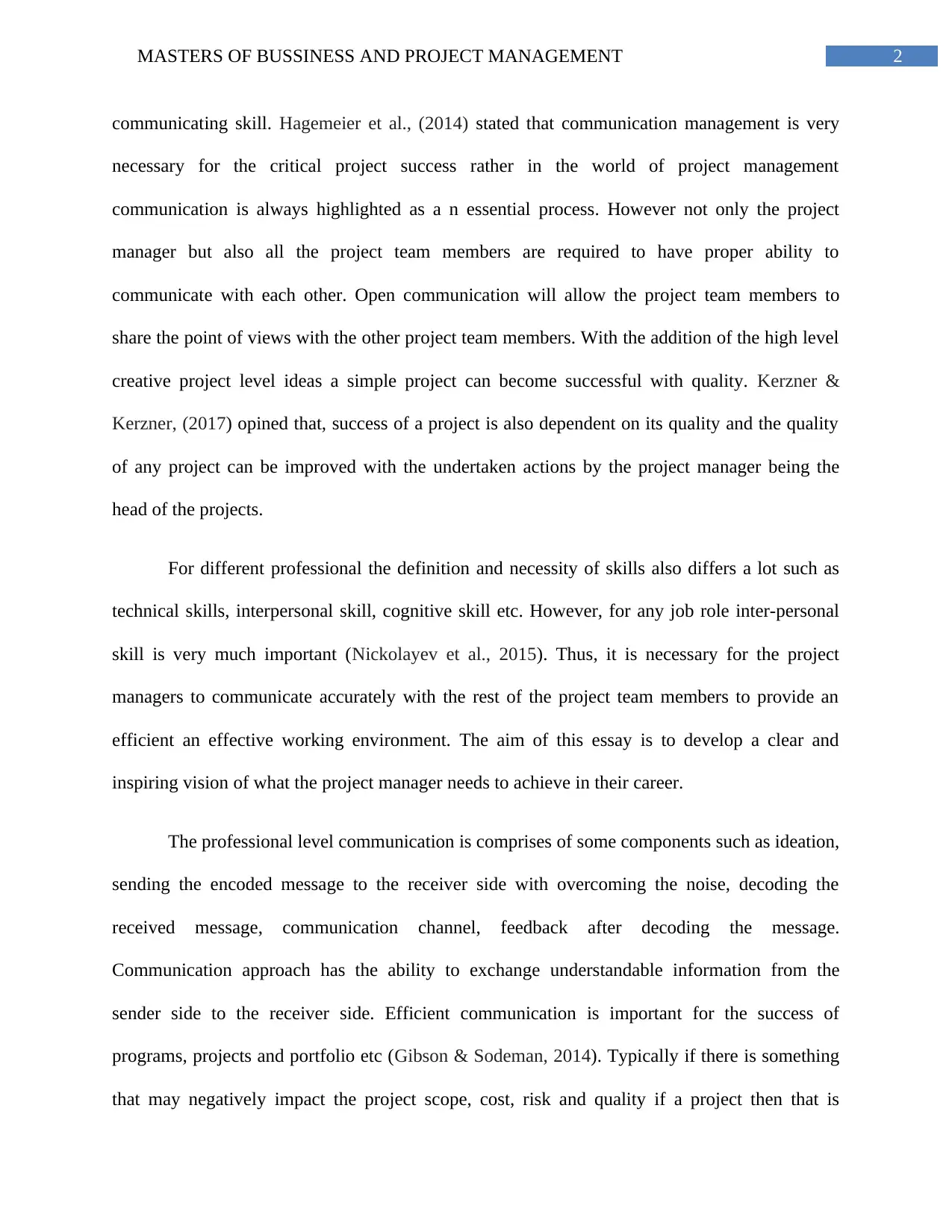
2MASTERS OF BUSSINESS AND PROJECT MANAGEMENT
communicating skill. Hagemeier et al., (2014) stated that communication management is very
necessary for the critical project success rather in the world of project management
communication is always highlighted as a n essential process. However not only the project
manager but also all the project team members are required to have proper ability to
communicate with each other. Open communication will allow the project team members to
share the point of views with the other project team members. With the addition of the high level
creative project level ideas a simple project can become successful with quality. Kerzner &
Kerzner, (2017) opined that, success of a project is also dependent on its quality and the quality
of any project can be improved with the undertaken actions by the project manager being the
head of the projects.
For different professional the definition and necessity of skills also differs a lot such as
technical skills, interpersonal skill, cognitive skill etc. However, for any job role inter-personal
skill is very much important (Nickolayev et al., 2015). Thus, it is necessary for the project
managers to communicate accurately with the rest of the project team members to provide an
efficient an effective working environment. The aim of this essay is to develop a clear and
inspiring vision of what the project manager needs to achieve in their career.
The professional level communication is comprises of some components such as ideation,
sending the encoded message to the receiver side with overcoming the noise, decoding the
received message, communication channel, feedback after decoding the message.
Communication approach has the ability to exchange understandable information from the
sender side to the receiver side. Efficient communication is important for the success of
programs, projects and portfolio etc (Gibson & Sodeman, 2014). Typically if there is something
that may negatively impact the project scope, cost, risk and quality if a project then that is
communicating skill. Hagemeier et al., (2014) stated that communication management is very
necessary for the critical project success rather in the world of project management
communication is always highlighted as a n essential process. However not only the project
manager but also all the project team members are required to have proper ability to
communicate with each other. Open communication will allow the project team members to
share the point of views with the other project team members. With the addition of the high level
creative project level ideas a simple project can become successful with quality. Kerzner &
Kerzner, (2017) opined that, success of a project is also dependent on its quality and the quality
of any project can be improved with the undertaken actions by the project manager being the
head of the projects.
For different professional the definition and necessity of skills also differs a lot such as
technical skills, interpersonal skill, cognitive skill etc. However, for any job role inter-personal
skill is very much important (Nickolayev et al., 2015). Thus, it is necessary for the project
managers to communicate accurately with the rest of the project team members to provide an
efficient an effective working environment. The aim of this essay is to develop a clear and
inspiring vision of what the project manager needs to achieve in their career.
The professional level communication is comprises of some components such as ideation,
sending the encoded message to the receiver side with overcoming the noise, decoding the
received message, communication channel, feedback after decoding the message.
Communication approach has the ability to exchange understandable information from the
sender side to the receiver side. Efficient communication is important for the success of
programs, projects and portfolio etc (Gibson & Sodeman, 2014). Typically if there is something
that may negatively impact the project scope, cost, risk and quality if a project then that is
⊘ This is a preview!⊘
Do you want full access?
Subscribe today to unlock all pages.

Trusted by 1+ million students worldwide
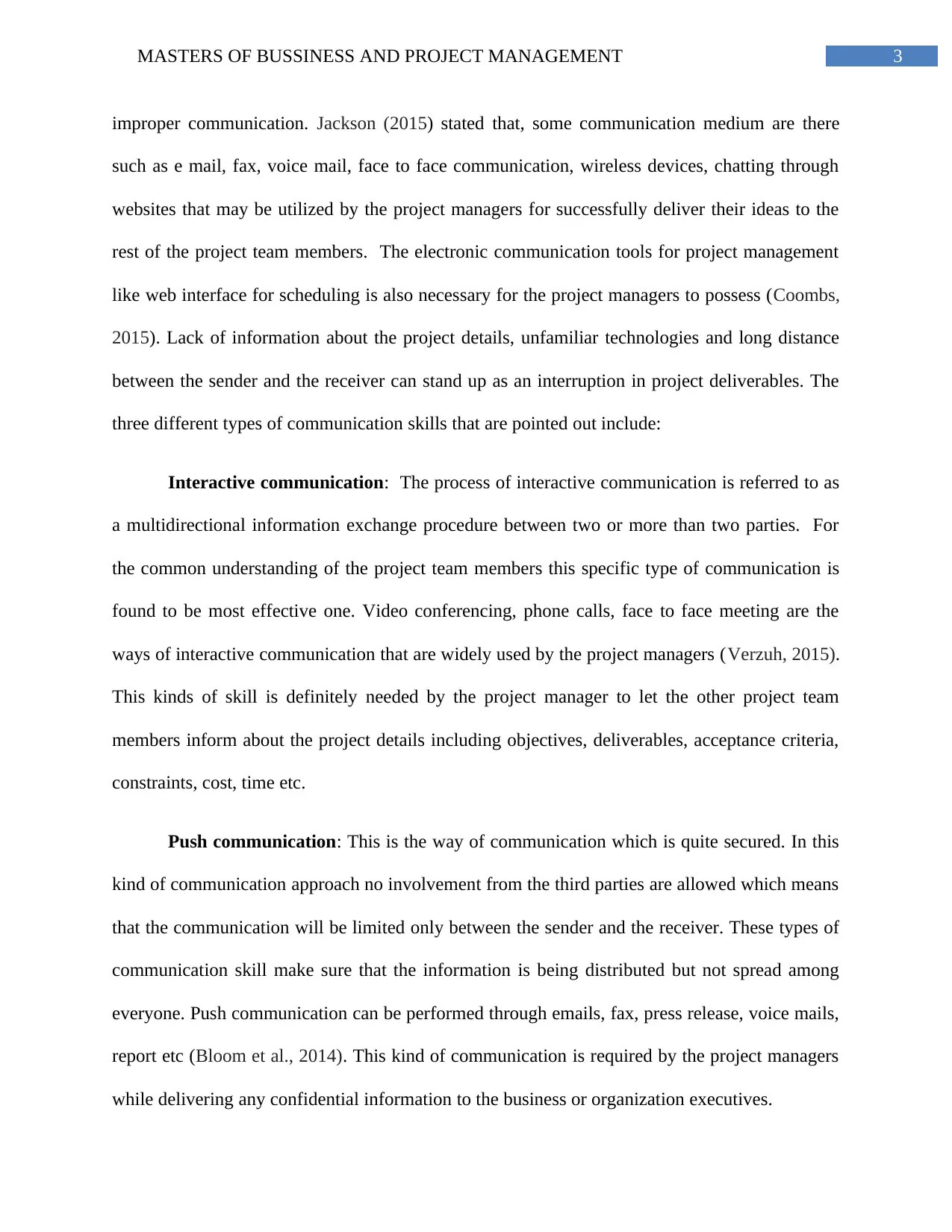
3MASTERS OF BUSSINESS AND PROJECT MANAGEMENT
improper communication. Jackson (2015) stated that, some communication medium are there
such as e mail, fax, voice mail, face to face communication, wireless devices, chatting through
websites that may be utilized by the project managers for successfully deliver their ideas to the
rest of the project team members. The electronic communication tools for project management
like web interface for scheduling is also necessary for the project managers to possess (Coombs,
2015). Lack of information about the project details, unfamiliar technologies and long distance
between the sender and the receiver can stand up as an interruption in project deliverables. The
three different types of communication skills that are pointed out include:
Interactive communication: The process of interactive communication is referred to as
a multidirectional information exchange procedure between two or more than two parties. For
the common understanding of the project team members this specific type of communication is
found to be most effective one. Video conferencing, phone calls, face to face meeting are the
ways of interactive communication that are widely used by the project managers (Verzuh, 2015).
This kinds of skill is definitely needed by the project manager to let the other project team
members inform about the project details including objectives, deliverables, acceptance criteria,
constraints, cost, time etc.
Push communication: This is the way of communication which is quite secured. In this
kind of communication approach no involvement from the third parties are allowed which means
that the communication will be limited only between the sender and the receiver. These types of
communication skill make sure that the information is being distributed but not spread among
everyone. Push communication can be performed through emails, fax, press release, voice mails,
report etc (Bloom et al., 2014). This kind of communication is required by the project managers
while delivering any confidential information to the business or organization executives.
improper communication. Jackson (2015) stated that, some communication medium are there
such as e mail, fax, voice mail, face to face communication, wireless devices, chatting through
websites that may be utilized by the project managers for successfully deliver their ideas to the
rest of the project team members. The electronic communication tools for project management
like web interface for scheduling is also necessary for the project managers to possess (Coombs,
2015). Lack of information about the project details, unfamiliar technologies and long distance
between the sender and the receiver can stand up as an interruption in project deliverables. The
three different types of communication skills that are pointed out include:
Interactive communication: The process of interactive communication is referred to as
a multidirectional information exchange procedure between two or more than two parties. For
the common understanding of the project team members this specific type of communication is
found to be most effective one. Video conferencing, phone calls, face to face meeting are the
ways of interactive communication that are widely used by the project managers (Verzuh, 2015).
This kinds of skill is definitely needed by the project manager to let the other project team
members inform about the project details including objectives, deliverables, acceptance criteria,
constraints, cost, time etc.
Push communication: This is the way of communication which is quite secured. In this
kind of communication approach no involvement from the third parties are allowed which means
that the communication will be limited only between the sender and the receiver. These types of
communication skill make sure that the information is being distributed but not spread among
everyone. Push communication can be performed through emails, fax, press release, voice mails,
report etc (Bloom et al., 2014). This kind of communication is required by the project managers
while delivering any confidential information to the business or organization executives.
Paraphrase This Document
Need a fresh take? Get an instant paraphrase of this document with our AI Paraphraser
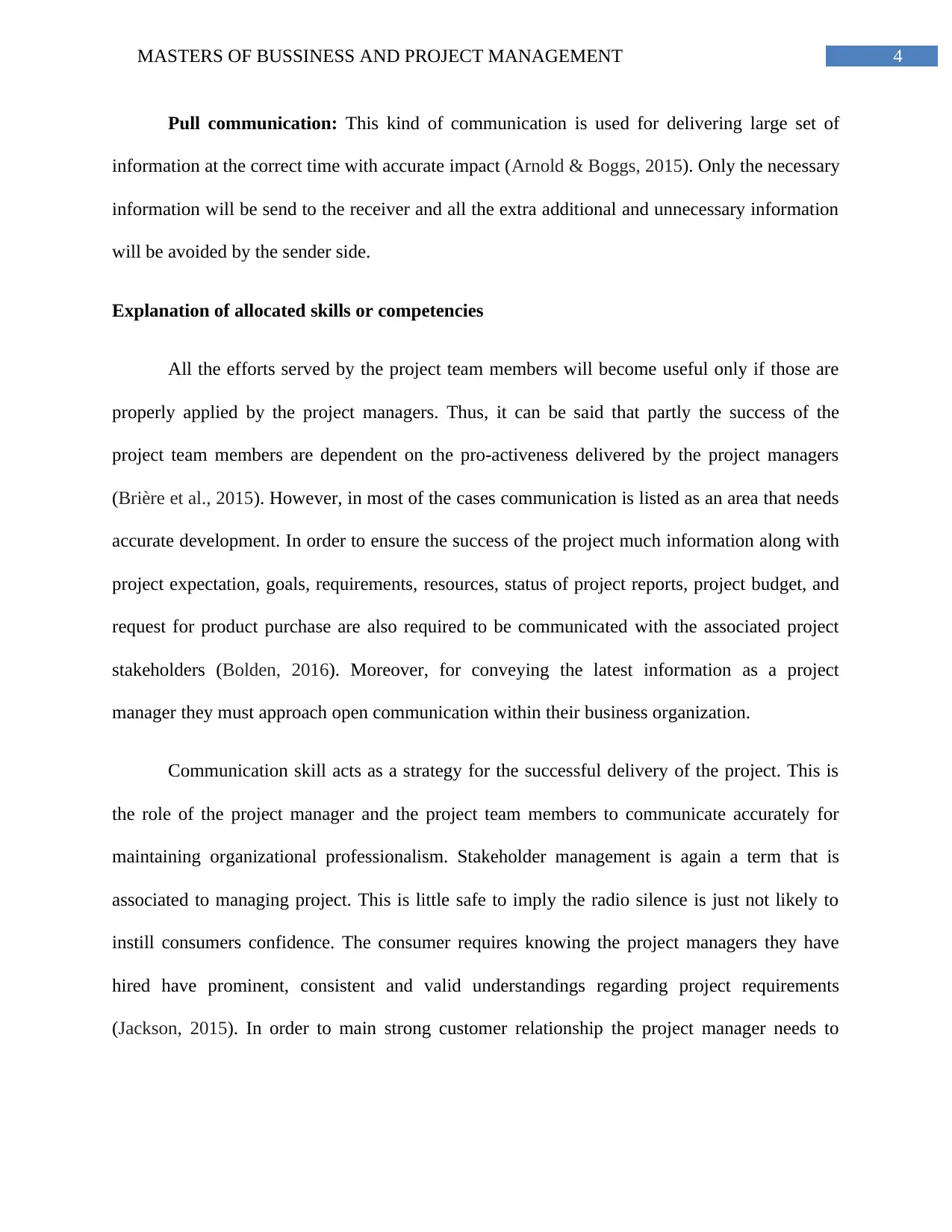
4MASTERS OF BUSSINESS AND PROJECT MANAGEMENT
Pull communication: This kind of communication is used for delivering large set of
information at the correct time with accurate impact (Arnold & Boggs, 2015). Only the necessary
information will be send to the receiver and all the extra additional and unnecessary information
will be avoided by the sender side.
Explanation of allocated skills or competencies
All the efforts served by the project team members will become useful only if those are
properly applied by the project managers. Thus, it can be said that partly the success of the
project team members are dependent on the pro-activeness delivered by the project managers
(Brière et al., 2015). However, in most of the cases communication is listed as an area that needs
accurate development. In order to ensure the success of the project much information along with
project expectation, goals, requirements, resources, status of project reports, project budget, and
request for product purchase are also required to be communicated with the associated project
stakeholders (Bolden, 2016). Moreover, for conveying the latest information as a project
manager they must approach open communication within their business organization.
Communication skill acts as a strategy for the successful delivery of the project. This is
the role of the project manager and the project team members to communicate accurately for
maintaining organizational professionalism. Stakeholder management is again a term that is
associated to managing project. This is little safe to imply the radio silence is just not likely to
instill consumers confidence. The consumer requires knowing the project managers they have
hired have prominent, consistent and valid understandings regarding project requirements
(Jackson, 2015). In order to main strong customer relationship the project manager needs to
Pull communication: This kind of communication is used for delivering large set of
information at the correct time with accurate impact (Arnold & Boggs, 2015). Only the necessary
information will be send to the receiver and all the extra additional and unnecessary information
will be avoided by the sender side.
Explanation of allocated skills or competencies
All the efforts served by the project team members will become useful only if those are
properly applied by the project managers. Thus, it can be said that partly the success of the
project team members are dependent on the pro-activeness delivered by the project managers
(Brière et al., 2015). However, in most of the cases communication is listed as an area that needs
accurate development. In order to ensure the success of the project much information along with
project expectation, goals, requirements, resources, status of project reports, project budget, and
request for product purchase are also required to be communicated with the associated project
stakeholders (Bolden, 2016). Moreover, for conveying the latest information as a project
manager they must approach open communication within their business organization.
Communication skill acts as a strategy for the successful delivery of the project. This is
the role of the project manager and the project team members to communicate accurately for
maintaining organizational professionalism. Stakeholder management is again a term that is
associated to managing project. This is little safe to imply the radio silence is just not likely to
instill consumers confidence. The consumer requires knowing the project managers they have
hired have prominent, consistent and valid understandings regarding project requirements
(Jackson, 2015). In order to main strong customer relationship the project manager needs to
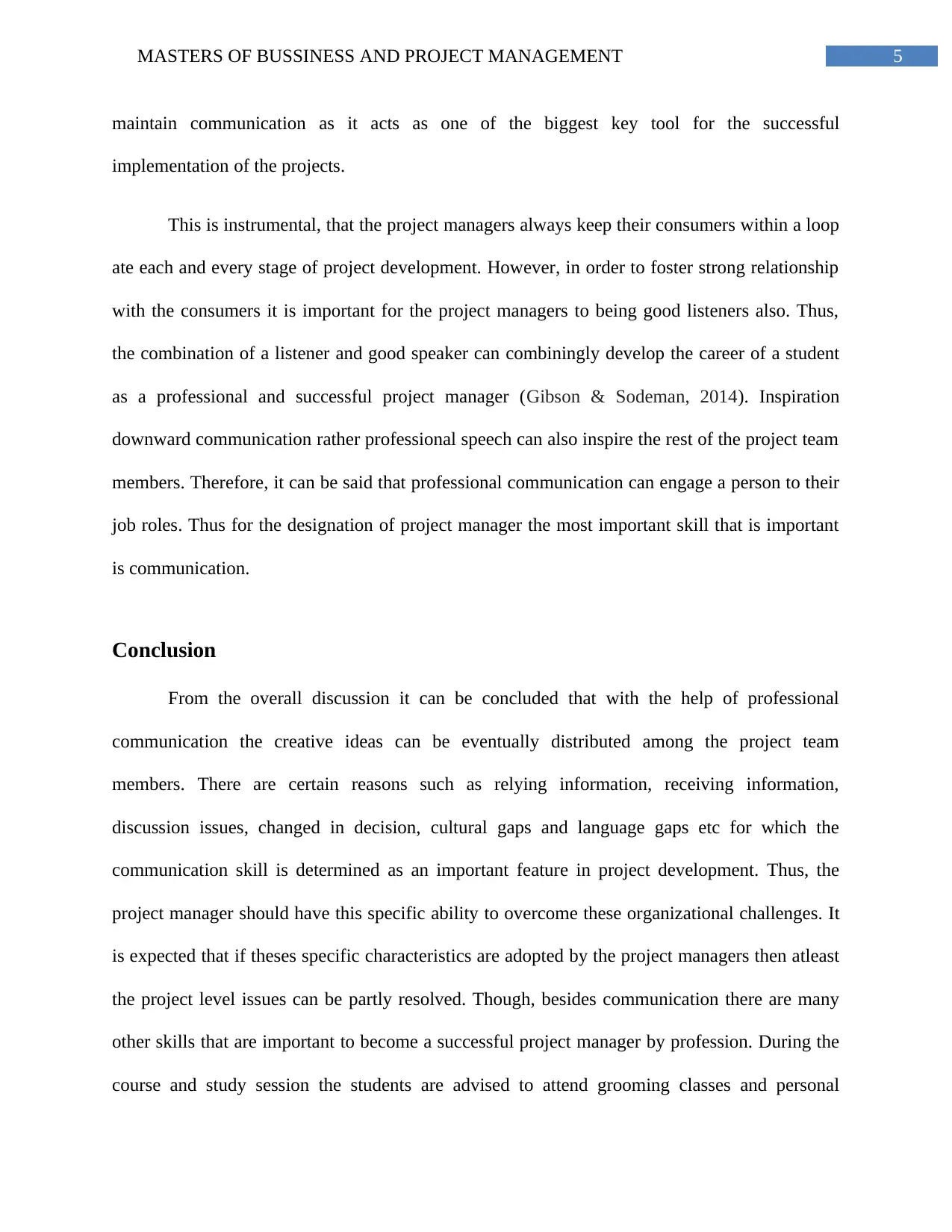
5MASTERS OF BUSSINESS AND PROJECT MANAGEMENT
maintain communication as it acts as one of the biggest key tool for the successful
implementation of the projects.
This is instrumental, that the project managers always keep their consumers within a loop
ate each and every stage of project development. However, in order to foster strong relationship
with the consumers it is important for the project managers to being good listeners also. Thus,
the combination of a listener and good speaker can combiningly develop the career of a student
as a professional and successful project manager (Gibson & Sodeman, 2014). Inspiration
downward communication rather professional speech can also inspire the rest of the project team
members. Therefore, it can be said that professional communication can engage a person to their
job roles. Thus for the designation of project manager the most important skill that is important
is communication.
Conclusion
From the overall discussion it can be concluded that with the help of professional
communication the creative ideas can be eventually distributed among the project team
members. There are certain reasons such as relying information, receiving information,
discussion issues, changed in decision, cultural gaps and language gaps etc for which the
communication skill is determined as an important feature in project development. Thus, the
project manager should have this specific ability to overcome these organizational challenges. It
is expected that if theses specific characteristics are adopted by the project managers then atleast
the project level issues can be partly resolved. Though, besides communication there are many
other skills that are important to become a successful project manager by profession. During the
course and study session the students are advised to attend grooming classes and personal
maintain communication as it acts as one of the biggest key tool for the successful
implementation of the projects.
This is instrumental, that the project managers always keep their consumers within a loop
ate each and every stage of project development. However, in order to foster strong relationship
with the consumers it is important for the project managers to being good listeners also. Thus,
the combination of a listener and good speaker can combiningly develop the career of a student
as a professional and successful project manager (Gibson & Sodeman, 2014). Inspiration
downward communication rather professional speech can also inspire the rest of the project team
members. Therefore, it can be said that professional communication can engage a person to their
job roles. Thus for the designation of project manager the most important skill that is important
is communication.
Conclusion
From the overall discussion it can be concluded that with the help of professional
communication the creative ideas can be eventually distributed among the project team
members. There are certain reasons such as relying information, receiving information,
discussion issues, changed in decision, cultural gaps and language gaps etc for which the
communication skill is determined as an important feature in project development. Thus, the
project manager should have this specific ability to overcome these organizational challenges. It
is expected that if theses specific characteristics are adopted by the project managers then atleast
the project level issues can be partly resolved. Though, besides communication there are many
other skills that are important to become a successful project manager by profession. During the
course and study session the students are advised to attend grooming classes and personal
⊘ This is a preview!⊘
Do you want full access?
Subscribe today to unlock all pages.

Trusted by 1+ million students worldwide
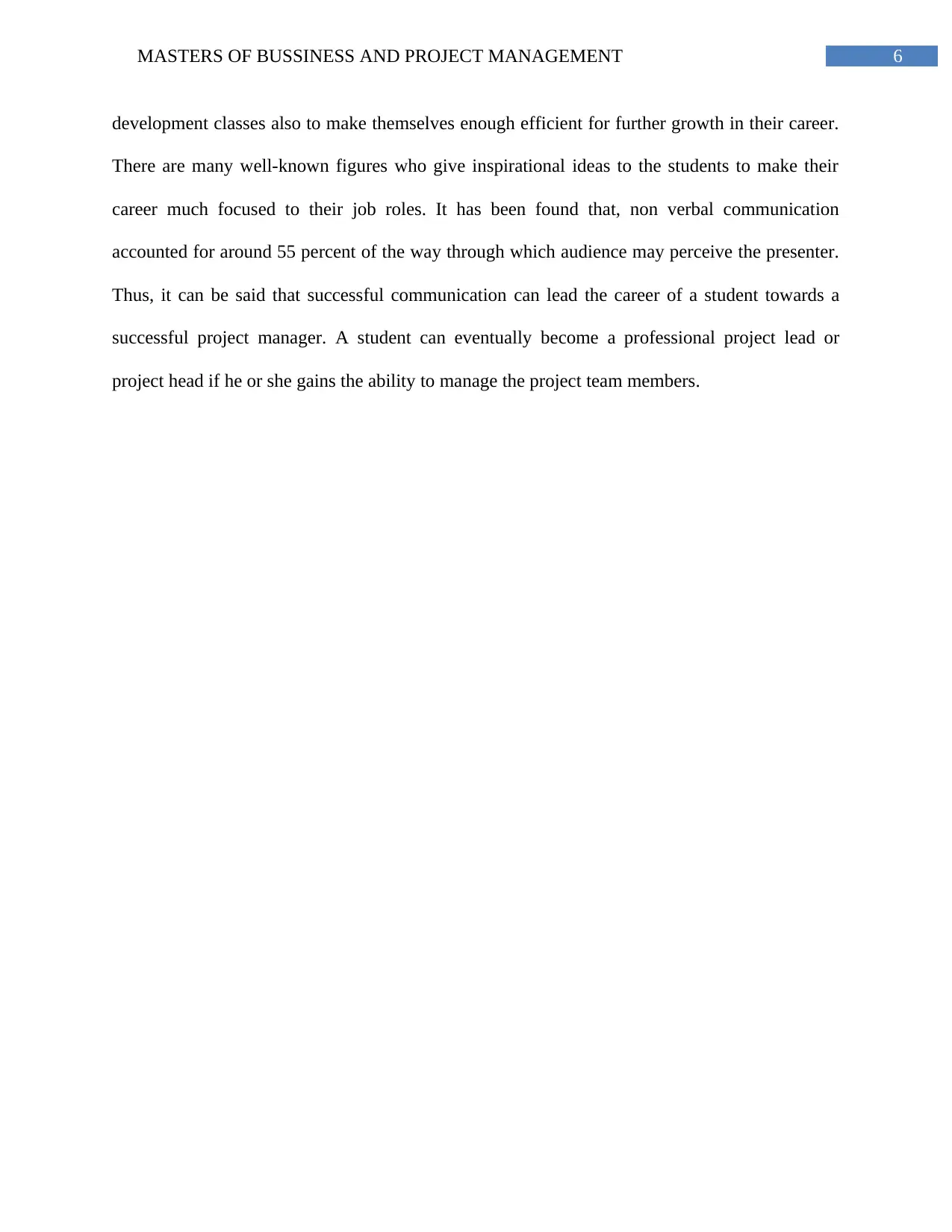
6MASTERS OF BUSSINESS AND PROJECT MANAGEMENT
development classes also to make themselves enough efficient for further growth in their career.
There are many well-known figures who give inspirational ideas to the students to make their
career much focused to their job roles. It has been found that, non verbal communication
accounted for around 55 percent of the way through which audience may perceive the presenter.
Thus, it can be said that successful communication can lead the career of a student towards a
successful project manager. A student can eventually become a professional project lead or
project head if he or she gains the ability to manage the project team members.
development classes also to make themselves enough efficient for further growth in their career.
There are many well-known figures who give inspirational ideas to the students to make their
career much focused to their job roles. It has been found that, non verbal communication
accounted for around 55 percent of the way through which audience may perceive the presenter.
Thus, it can be said that successful communication can lead the career of a student towards a
successful project manager. A student can eventually become a professional project lead or
project head if he or she gains the ability to manage the project team members.
Paraphrase This Document
Need a fresh take? Get an instant paraphrase of this document with our AI Paraphraser
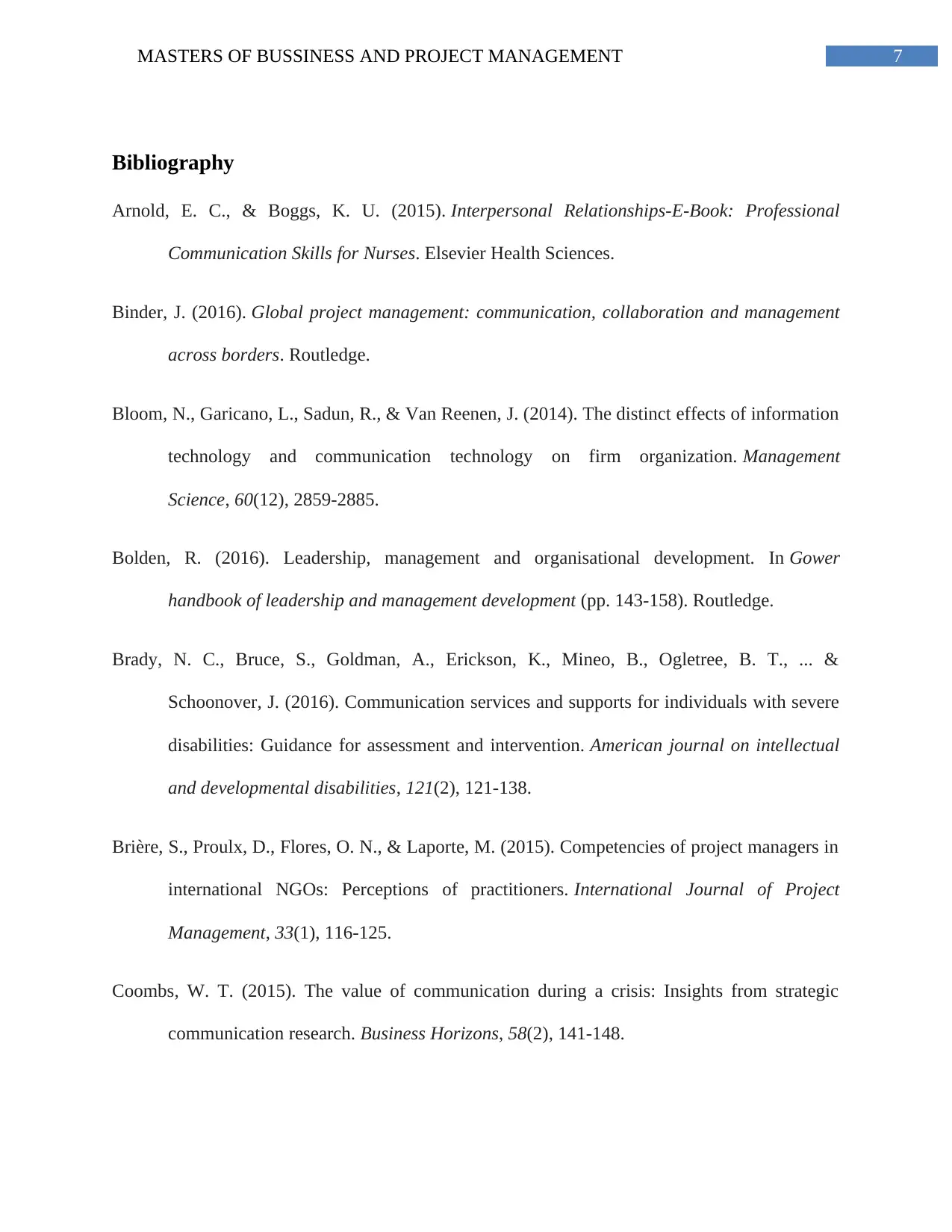
7MASTERS OF BUSSINESS AND PROJECT MANAGEMENT
Bibliography
Arnold, E. C., & Boggs, K. U. (2015). Interpersonal Relationships-E-Book: Professional
Communication Skills for Nurses. Elsevier Health Sciences.
Binder, J. (2016). Global project management: communication, collaboration and management
across borders. Routledge.
Bloom, N., Garicano, L., Sadun, R., & Van Reenen, J. (2014). The distinct effects of information
technology and communication technology on firm organization. Management
Science, 60(12), 2859-2885.
Bolden, R. (2016). Leadership, management and organisational development. In Gower
handbook of leadership and management development (pp. 143-158). Routledge.
Brady, N. C., Bruce, S., Goldman, A., Erickson, K., Mineo, B., Ogletree, B. T., ... &
Schoonover, J. (2016). Communication services and supports for individuals with severe
disabilities: Guidance for assessment and intervention. American journal on intellectual
and developmental disabilities, 121(2), 121-138.
Brière, S., Proulx, D., Flores, O. N., & Laporte, M. (2015). Competencies of project managers in
international NGOs: Perceptions of practitioners. International Journal of Project
Management, 33(1), 116-125.
Coombs, W. T. (2015). The value of communication during a crisis: Insights from strategic
communication research. Business Horizons, 58(2), 141-148.
Bibliography
Arnold, E. C., & Boggs, K. U. (2015). Interpersonal Relationships-E-Book: Professional
Communication Skills for Nurses. Elsevier Health Sciences.
Binder, J. (2016). Global project management: communication, collaboration and management
across borders. Routledge.
Bloom, N., Garicano, L., Sadun, R., & Van Reenen, J. (2014). The distinct effects of information
technology and communication technology on firm organization. Management
Science, 60(12), 2859-2885.
Bolden, R. (2016). Leadership, management and organisational development. In Gower
handbook of leadership and management development (pp. 143-158). Routledge.
Brady, N. C., Bruce, S., Goldman, A., Erickson, K., Mineo, B., Ogletree, B. T., ... &
Schoonover, J. (2016). Communication services and supports for individuals with severe
disabilities: Guidance for assessment and intervention. American journal on intellectual
and developmental disabilities, 121(2), 121-138.
Brière, S., Proulx, D., Flores, O. N., & Laporte, M. (2015). Competencies of project managers in
international NGOs: Perceptions of practitioners. International Journal of Project
Management, 33(1), 116-125.
Coombs, W. T. (2015). The value of communication during a crisis: Insights from strategic
communication research. Business Horizons, 58(2), 141-148.
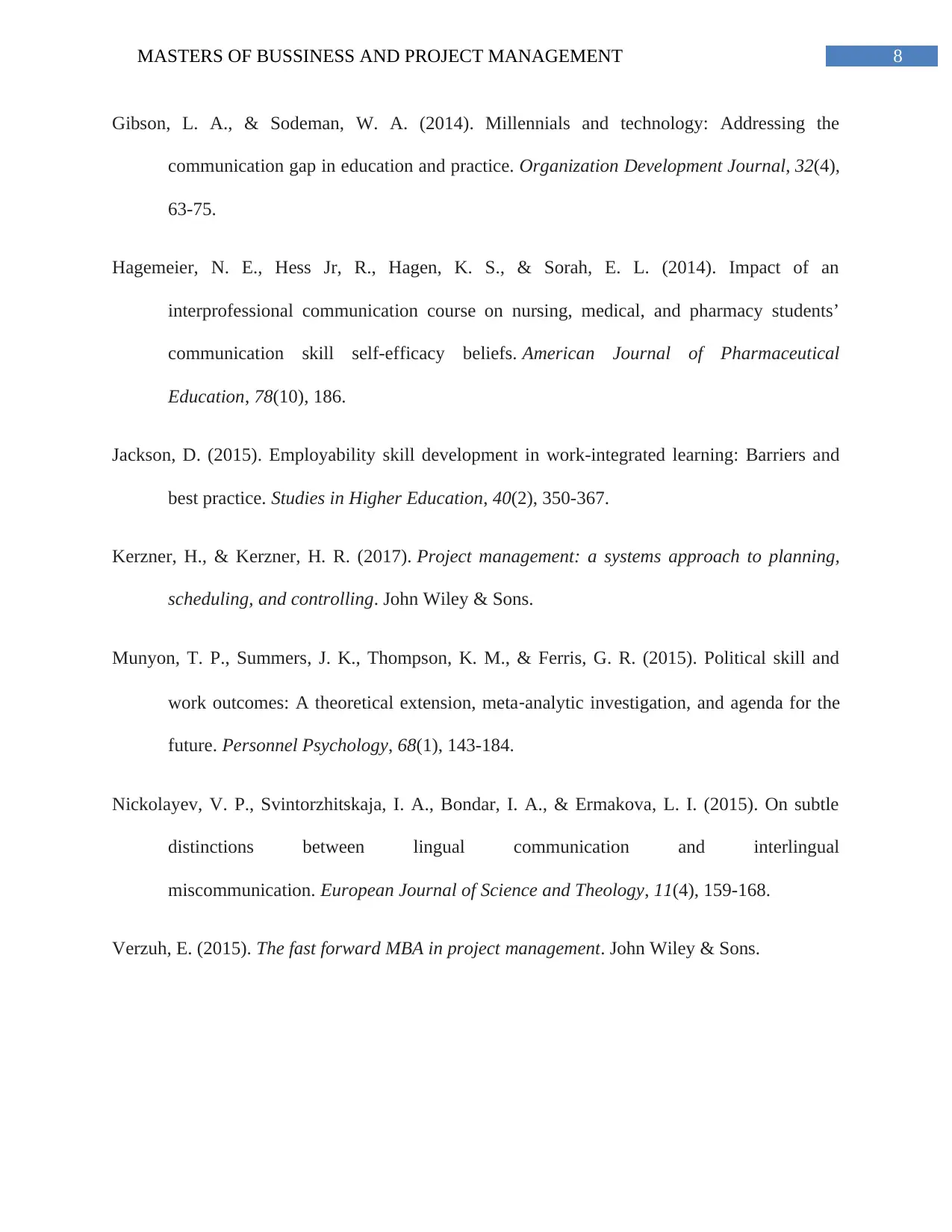
8MASTERS OF BUSSINESS AND PROJECT MANAGEMENT
Gibson, L. A., & Sodeman, W. A. (2014). Millennials and technology: Addressing the
communication gap in education and practice. Organization Development Journal, 32(4),
63-75.
Hagemeier, N. E., Hess Jr, R., Hagen, K. S., & Sorah, E. L. (2014). Impact of an
interprofessional communication course on nursing, medical, and pharmacy students’
communication skill self-efficacy beliefs. American Journal of Pharmaceutical
Education, 78(10), 186.
Jackson, D. (2015). Employability skill development in work-integrated learning: Barriers and
best practice. Studies in Higher Education, 40(2), 350-367.
Kerzner, H., & Kerzner, H. R. (2017). Project management: a systems approach to planning,
scheduling, and controlling. John Wiley & Sons.
Munyon, T. P., Summers, J. K., Thompson, K. M., & Ferris, G. R. (2015). Political skill and
work outcomes: A theoretical extension, meta‐analytic investigation, and agenda for the
future. Personnel Psychology, 68(1), 143-184.
Nickolayev, V. P., Svintorzhitskaja, I. A., Bondar, I. A., & Ermakova, L. I. (2015). On subtle
distinctions between lingual communication and interlingual
miscommunication. European Journal of Science and Theology, 11(4), 159-168.
Verzuh, E. (2015). The fast forward MBA in project management. John Wiley & Sons.
Gibson, L. A., & Sodeman, W. A. (2014). Millennials and technology: Addressing the
communication gap in education and practice. Organization Development Journal, 32(4),
63-75.
Hagemeier, N. E., Hess Jr, R., Hagen, K. S., & Sorah, E. L. (2014). Impact of an
interprofessional communication course on nursing, medical, and pharmacy students’
communication skill self-efficacy beliefs. American Journal of Pharmaceutical
Education, 78(10), 186.
Jackson, D. (2015). Employability skill development in work-integrated learning: Barriers and
best practice. Studies in Higher Education, 40(2), 350-367.
Kerzner, H., & Kerzner, H. R. (2017). Project management: a systems approach to planning,
scheduling, and controlling. John Wiley & Sons.
Munyon, T. P., Summers, J. K., Thompson, K. M., & Ferris, G. R. (2015). Political skill and
work outcomes: A theoretical extension, meta‐analytic investigation, and agenda for the
future. Personnel Psychology, 68(1), 143-184.
Nickolayev, V. P., Svintorzhitskaja, I. A., Bondar, I. A., & Ermakova, L. I. (2015). On subtle
distinctions between lingual communication and interlingual
miscommunication. European Journal of Science and Theology, 11(4), 159-168.
Verzuh, E. (2015). The fast forward MBA in project management. John Wiley & Sons.
⊘ This is a preview!⊘
Do you want full access?
Subscribe today to unlock all pages.

Trusted by 1+ million students worldwide
1 out of 9
Related Documents
Your All-in-One AI-Powered Toolkit for Academic Success.
+13062052269
info@desklib.com
Available 24*7 on WhatsApp / Email
![[object Object]](/_next/static/media/star-bottom.7253800d.svg)
Unlock your academic potential
Copyright © 2020–2026 A2Z Services. All Rights Reserved. Developed and managed by ZUCOL.





